
From data cleaning to managing change, businesses need a hugely diverse range of skills to be able to get the most value from their data. ODI’s Trainer Dr Dave Tarrant and ODI Associate Simon Bullmore explain how the Data Skills Framework provides a more balanced view of the range of in-house capability required, to help businesses make a decision on what’s needed
Data has a lot of potential for business, but it is also a complex landscape. Exciting developments in AI might get the headlines, but domains like data governance and data ethics also need attention if a business is to take advantage of data whilst avoiding harmful impacts. The Data Skills Framework provides leaders with a more balanced of the capability their business needs. By breaking the data skills down into distinct topics, the framework makes it easier to assess needs and plan for the future.
Our work with organisations like the Coop, Deutsche Bank and the BBC shows that organisations get more out of data when they develop a balanced view of what data literacy actually requires at both an individual and an organisational level. Data literacy isn’t just about programming, data management or data protection. It's a diverse blend of skills that together help organisations get the most from data, and help individuals be more effective in their current roles.

The Data Skills Framework provides this more balanced view by identifying the broad range of skills a business needs to get value from data. As might be expected, this broad view covers the skills more commonly associated with the data domain – data analytics, programming and visualisation. But, what leaders often find interesting is that the framework also shows how strategy, innovation and ethics are an essential part of the puzzle. This reflects the ODI’s theory of change which suggests that data as a domain isn’t just about technology. It’s about culture and ways of working. It’s about being able to make better decisions and communicate the impact these decisions have on people.
This might be a different approach to the one people expect from the ODI. When people hear the word ‘data’ they perhaps expect us to be very focused on data as a technology. It’s true that we are interested in the potential for data technologies. However in our role as advisors to businesses and government and through our R&D activity we’ve seen that alongside a strategy for technology it’s essential for organisations to address a broader set of concerns, which includes data ethics, policy and culture.
What problems does the data skills framework solve?
A major challenge for many leaders is the siloed nature of their organisations. The skills framework helps identify siloed initiatives – whether they are data analytics, data protection or data science. These might be projects or teams who are doing work that is important to the business but who are failing to make the strategic impact that was expected.
The skills framework can help to identify whether the full range of skills needed for these projects to make an impact is being employed. So, for example, a new data analytics tool won’t succeed unless it’s implemented in a sustainable way, employing effective change practices. Similarly, automated decision tools may create reputational risk if ethical issues aren’t addressed.
The framework can also help avoid wasteful investment by identifying how a range of topics need to be addressed for data to have an impact. For example, before building new data analytics capabilities leaders might want to consider how these capabilities will make an impact, what policies might need to change and how revenue may be generated.
This isn't just a business issue, it’s a societal issue
There is a degree of fear around data for many people. Fear that data-driven technology like automation and AI will take jobs. Fear of getting left behind because data skills are perceived to be about incomprehensible technology. The problem with this kind of fear is that it can provoke unhelpful reactions – either ignoring the domain entirely, or hurrying to catch-up on innovation by jumping straight into technology fixes.
The skills framework can help demystify things for those who fear data, and it shows there is a place for a range of skills. Yes, you need fundamental literacy such as classifying data, creating value and boosting usability – but from there, there’s a diverse choice of pathways. Pathways that focus on innovation and business value, strategy and change, and policy and insights.
It’s not about turning everyone into data scientists, but helping people be more comfortable about how they work with data in their current role.
The challenge is that many data skills training programmes are focused on specific job roles or activities. They are prescriptive, dictating a starting point and an end goal. There are a few potential issues with this kind of approach, but let’s focus on two we most commonly encounter.
The first is that prescriptive journeys can be a turn-off for many learners, particularly if the endpoint doesn’t feel relevant to them, and the path is not tailored to their needs. This reflects the second issue. In an age of on-demand media and online content, shaped around our interests and desires, people have come to expect experiences tailored to what they want and to acquire content when they want it, in the format they want it. The advantage of the framework is that it sign-posts a direction and suggest topics on the journey. Individuals then have the flexibility to decide how to get there.
How is the framework used by business leaders?
There may be fear and a bit of confusion around data. However, managers, workers and leaders still recognise the need to develop their skills. The framework helps shape both where individuals and organisations should start and where their future focus should be. It helps identify gaps in skills and capacity, enabling better investment decisions. It informs how programmes should be developed and the kind of content and approaches that might be needed.
The basis for this is using the framework as a mental model for a range of strategic and learning activities. On the strategic side, leaders can use the framework for planning strategy execution by using it to analyse current strengths and weaknesses, then comparing them to the capacity and capabilities needed to execute strategy. This also points to potential uses in learning and development activities - from training needs analysis to curriculum development, to learner engagement.
Where to start?
If you’re a leader interested in the strategic use of data in your business and sector we suggest you start by using the framework to reflect on your own skills. Are your skills more aligned to the left or the right-hand side of the framework? What might be the impact if you have an unbalanced range of skills? What are you missing? Who in your business or network has complementary skills that could help?
Fundamentally, wherever your focus, the framework will help you make better decisions when it comes to skills and capability, and then provide a clear way of communicating those decisions to the people that matter.
The Open Data Institute is here to help anyone shape their journey and take their first steps. If you need help or advice complete the form below and we’ll point you in the right direction.